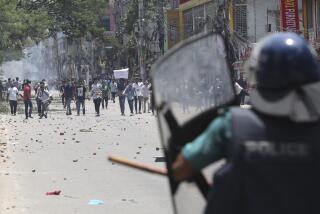THE WORLD - News from March 13, 2009
- Share via
ISLAMABAD, PAKISTAN — Police overwhelmed anti-government protesters Thursday in Karachi, Pakistan’s largest city, arresting opposition leaders and preventing several hundred lawyers and activists from leaving for a planned demonstration in Islamabad.
The government of President Asif Ali Zardari contends that public gatherings could serve as a focal point for terrorists and otherwise endanger property and lives.
Authorities also banned public gatherings in two key provinces and blocked major roads into Islamabad, the capital, with barriers and paramilitary vehicles.
“The government has resorted to raiding the houses of the leaders of political parties,” said Farooq Tariq, an official with the Labor Party. “I’ve been underground for the last three days.”
Lawyers were at the forefront of demonstrations against the government of then-President Pervez Musharraf, who incurred their wrath in part by firing dozens of senior judges in 2007 in an apparent bid to head off legal challenges to his rule. The attorneys have pressed Zardari to reinstate key judges.
In other news Thursday, a missile believed to have been fired by a U.S. drone aircraft hit a house in northwestern Pakistan that officials said was occupied by militants. Unconfirmed reports put the death toll at seven to 10 people. Their identities were not immediately known. The use of U.S. drones in Pakistan is controversial amid concern about sovereignty and the loss of civilian life.
The Pakistani government’s crackdown is aimed at quelling demonstrations in major cities that are being held as part of a several-day “long march” -- actually a long drive -- to Islamabad leading to a planned sit-in Monday.
The growing political instability is raising concern that the armed forces could intervene, as they have repeatedly in this nuclear-armed nation prone to military coups.
“If the politicians can’t settle their differences, the military will come back in,” said Zulfiqar Ahmed, general manager of the Islamabad Marriott. “They’ll try not to, they don’t want to, but as a last resort they will.”
Political analysts said it remained to be seen whether the government’s heavy-handed tactics would prove effective. Some said the moves had succeeded in blunting the public appetite for protest, at least in the short term.
Others said it would have been better, particularly for a democratically elected government, to let the demonstrations go forward as long as they remained nonviolent. The strategy would bank on the hope that the movement would eventually lose steam, as a similar demonstration by lawyers did a few months ago.
“In a democracy, even one as battered and messy as ours, citizens have the right to peaceful protest,” Ejaz Haider, op-ed editor of the Daily Times, wrote Thursday in the paper.
Thursday morning, paramilitary forces and police surrounded Karachi court buildings in which lawyers had assembled. Several hundred black-suited lawyers broke through the cordon, however, and left the buildings on foot, joining political activists carrying party flags and chanting anti-government slogans.
When the group tried to enter a highway leading out of the city, police blocked them. About 200 protesters got as far as a toll plaza but were overwhelmed by more than twice as many police officers.
“They’ve come up with a heavy hand in Karachi,” said Aitzaz Ahsan, a leading lawyer, human rights activist and protest leader. “But even if we can’t get to Islamabad March 16 and they block us everywhere, we’ll probably have another long march three weeks later. They have to deal with this issue.”
Elsewhere, police cordoned off routes to government buildings in the eastern city of Lahore, in Punjab province. But lawyers and an estimated 2,000 demonstrators were able to gather in a square for several hours near the provincial assembly building, where they chanted slogans and waved black protest flags.
Punjab, which accounts for about 60% of the nation’s population, is the political heart of Pakistan and a key area of contention between the ruling party and the opposition.
Other demonstrations were seen in the cities of Quetta, Peshawar and Multan.
The political crisis was sparked last month when the Supreme Court ruled that opposition leaders Nawaz Sharif and his brother Shahbaz could not serve in public office.
This emboldened critics, who stepped up calls for Zardari’s government to reinstate the fired judges and give up some of the wide-ranging presidential powers established by Musharraf.
On Thursday, U.S. Ambassador Anne W. Patterson met with Nawaz Sharif. The substance of their discussions was not immediately disclosed.
The United States has said relatively little about the situation other than calling on all sides to avoid violence. Zardari, widower of assassinated former Prime Minister Benazir Bhutto, is generally considered more pro-American than is Sharif. Sharif is seen as being closer to Islamic parties and conservative groups that are less supportive of the U.S.-led war in Afghanistan.
Pakistan has canceled all leave for police officers and was reportedly considering moving some of its frontier police and paramilitary forces to major cities.
--
More to Read
Sign up for Essential California
The most important California stories and recommendations in your inbox every morning.
You may occasionally receive promotional content from the Los Angeles Times.










